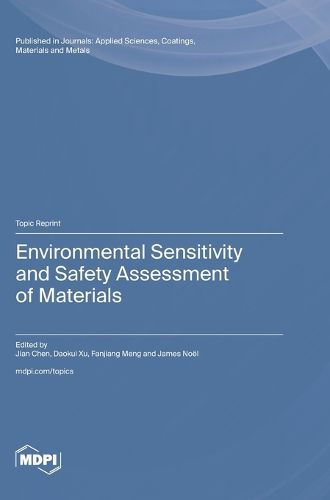Readings Newsletter
Become a Readings Member to make your shopping experience even easier.
Sign in or sign up for free!
You’re not far away from qualifying for FREE standard shipping within Australia
You’ve qualified for FREE standard shipping within Australia
The cart is loading…






This title is printed to order. This book may have been self-published. If so, we cannot guarantee the quality of the content. In the main most books will have gone through the editing process however some may not. We therefore suggest that you be aware of this before ordering this book. If in doubt check either the author or publisher’s details as we are unable to accept any returns unless they are faulty. Please contact us if you have any questions.
Research into the environmental sensitivity and safety assessment of materials is crucial for developing next-generation systems with both superior mechanical performance and better corrosion resistance. These studies can facilitate the design of durable materials and selection of those best suited for use in aggressive or complex environments, where maintaining long-term corrosion resistance over a defined service life is vital. They can also provide the scientific basis for forming corrosion mitigation strategies, including protective coatings, inhibitors, surface treatments, and other preventative techniques. The modeling and prediction of material degradation in corrosive environments is equally significant. Accurate predictive tools are crucial for safety assessments, maintenance scheduling, risk management, and the life-cycle optimization of infrastructure and industrial components. This multidisciplinary field spans thermodynamic and kinetic modeling, the identification and simulation of service environments, the advanced characterization of microstructures and passive films, mechanical and electrochemical property evaluation, and the development of innovative coatings and inhibitors. Additionally, it involves the use of computational and experimental methodologies to model corrosion behavior and assess failure modes. This Topic highlights cutting-edge research across these domains, aiming to enhance our understanding of corrosion mechanisms under service conditions, promote innovation in protective strategies, improve material longevity, and reduce the economic, environmental, and safety impacts of corrosion.
$9.00 standard shipping within Australia
FREE standard shipping within Australia for orders over $100.00
Express & International shipping calculated at checkout
This title is printed to order. This book may have been self-published. If so, we cannot guarantee the quality of the content. In the main most books will have gone through the editing process however some may not. We therefore suggest that you be aware of this before ordering this book. If in doubt check either the author or publisher’s details as we are unable to accept any returns unless they are faulty. Please contact us if you have any questions.
Research into the environmental sensitivity and safety assessment of materials is crucial for developing next-generation systems with both superior mechanical performance and better corrosion resistance. These studies can facilitate the design of durable materials and selection of those best suited for use in aggressive or complex environments, where maintaining long-term corrosion resistance over a defined service life is vital. They can also provide the scientific basis for forming corrosion mitigation strategies, including protective coatings, inhibitors, surface treatments, and other preventative techniques. The modeling and prediction of material degradation in corrosive environments is equally significant. Accurate predictive tools are crucial for safety assessments, maintenance scheduling, risk management, and the life-cycle optimization of infrastructure and industrial components. This multidisciplinary field spans thermodynamic and kinetic modeling, the identification and simulation of service environments, the advanced characterization of microstructures and passive films, mechanical and electrochemical property evaluation, and the development of innovative coatings and inhibitors. Additionally, it involves the use of computational and experimental methodologies to model corrosion behavior and assess failure modes. This Topic highlights cutting-edge research across these domains, aiming to enhance our understanding of corrosion mechanisms under service conditions, promote innovation in protective strategies, improve material longevity, and reduce the economic, environmental, and safety impacts of corrosion.